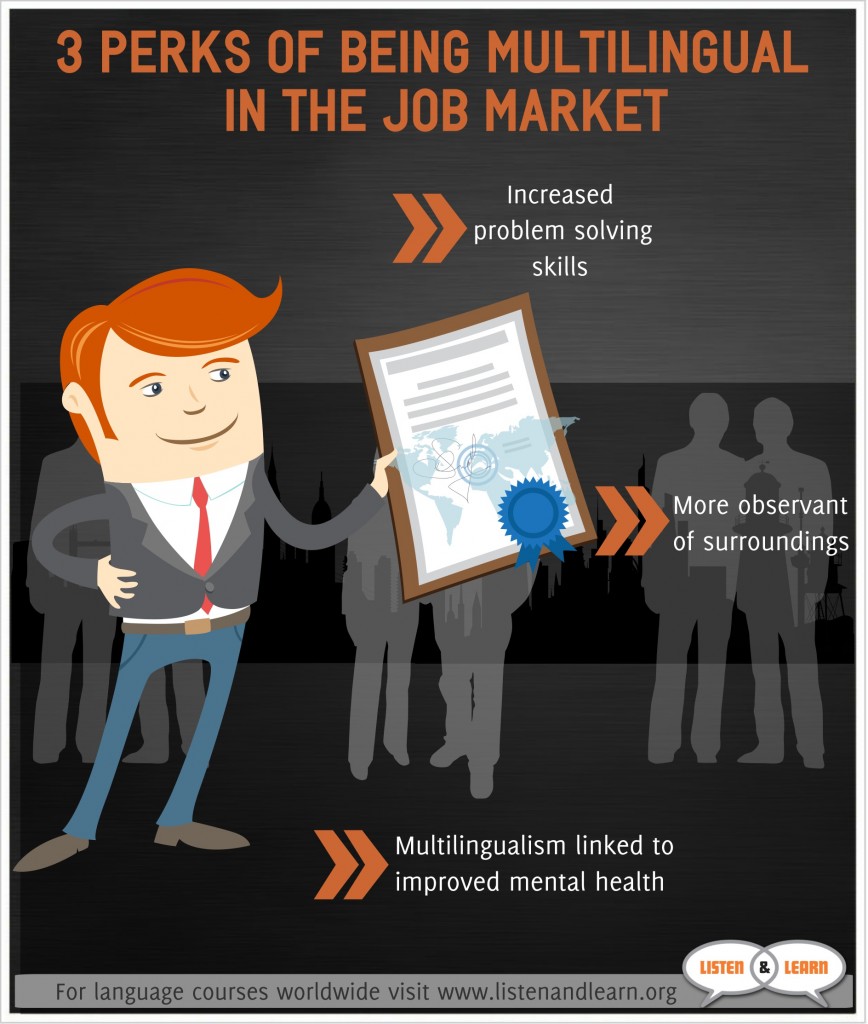3 Perks of Being Multilingual in the Job Market
In a globalising era such as ours, speaking more than one language has its obvious advantages. You can converse with members of varying ethnic and cultural backgrounds; you can traverse the world with a bit more ease, and you can talk about people in front of them without them even knowing. Come on, we’ve all done it.
But apparently, travel and communication benefits aren’t the only bonuses when it comes to being bilingual. According to a New York Times article published a couple of years ago, “being bilingual, it turns out, makes you smarter.” And what happens to smarter people? They get better jobs and make more money.
So there’s some incentive! – Check out all of our language courses, get started on raising your human capital and making yourself a bit more marketable in the workplace.
Table of Contents
***
That multilingual people are smarter than their monolingual counterparts is a bold claim, and it must not be interpreted out of context. Not all people that speak more than one language are smarter than those that speak only one. But a lot has changed since the 20th century when researchers and educators thought of being bilingual as a hindering interference.
Today, the linguistic community understands the enriching advantages of being multilingual and recognises the role of multilingualism in improved cognitive function unrelated to language.
But what does this have to do with employment, the job market, and salaries? A lot, it turns out. The Internet is rife with articles that argue for sizeable salary discrepancies between multilingual and monolingual people. However, despite plenty of anecdotal evidence, empirically, it doesn’t seem to pan out. Yet, being multilingual grants speakers skills and benefits that would help them excel in the job market. Here’s how:
They’re better at problem-solving
A number of studies and tests have been conducted to monitor the difference between the brain processes of multilingual and monolingual children. Is speaking two languages a hindrance or is it helpful?
Evidence suggests that multilingual children have more control over an executive function of the brain – which allows them to focus on important information more readily without getting distracted – making them more adept problem solvers, and more capable of succeeding at mentally demanding tasks.
No doubt, problem-solving and the ability to suppress unnecessary information in lieu of something useful is a valuable mechanism in a work environment. Being able to better perform job-wise would potentially render your employers more likely to award you promotions and salary increases.
They’re more observant of their surroundings
According to the aforementioned New York Times article, “that explanation increasingly appears inadequate, since studies have shown that bilinguals perform better than monolinguals even at tasks that do not require inhibition.” A more adequate description? Multilinguals are simply more aware of their surroundings.
And again, a heightened awareness of one’s environment is invaluable in the workplace. Succeeding in many professional fields requires you to constantly monitor your environment. You must juggle work and client relationships; you must stay abreast of internal and external issues; you must be able to multi-task. And to effectively multi-task you must be well aware of what’s going on around you.
So, there are skills you acquire as a multilingual person that help you succeed professionally, that potentially improve your likelihood of promotion, and that make you a more marketable person in the increasingly competitive job market. But, there are also bonuses that don’t involve cognitive skills per se.
They’re less likely to suffer from dementia
Numerous articles that discuss the advantages of bi- or multilingualism highlight that speaking two or more languages decreases your chances of suffering from dementia. Cognitive neuroscientist, Dr Ellen Bialystok proved it when she conducted studies comparing normally ageing bilinguals to normally ageing monolinguals. According to a Q&A featured in the New York Times, she found that “bilingual older adults performed better than monolingual older adults on executive control tasks.”
And that’s all well and good, but what does it have to do with employment? If a person maintains a higher level of control over the functions that allow him to better problem solve and monitor his surroundings, he will likely be more capable of remaining in the job market for longer, thus increasing his lifetime income.
***
So, there you have it. While the results remain inconclusive as to whether or not speaking more than one language will actually earn you more money, there are many advantages to it. And logic suggests that if you’re more cognitively equipped to deal with the rigours of the work world, you’ll do much better in it. So, get to it! And contact us to find language tutors near you!



